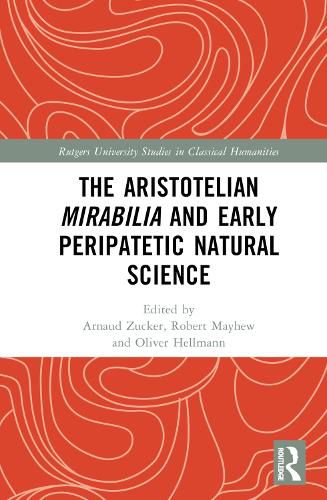Readings Newsletter
Become a Readings Member to make your shopping experience even easier.
Sign in or sign up for free!
You’re not far away from qualifying for FREE standard shipping within Australia
You’ve qualified for FREE standard shipping within Australia
The cart is loading…






This is the first volume devoted to the sections of the Aristotelian Mirabilia on natural science, filling a significant gap in the history of the Aristotelian study of nature and especially of animals.
The chapters in this volume explore the Mirabilia, or De mirabilibus auscultationibus (On Marvelous Things Heard), and its engagement with the natural sciences. The first two chapters deliver an introduction to this work: one a discussion of the history of the text and the other a discussion of Aristotelian epistemology and methodology, and the role of the Mirabilia in that context. This is followed by eight chapters that, together, are effectively a commentary on those sections of the Mirabilia with close connections to Aristotle's Historia animalium and to a number of Theophrastus' scientific treatises. Finally, the volume ends with two chapters on thematic topics connected to natural science running throughout the work, namely color and disease.
The Aristotelian Mirabilia and Early Peripatetic Natural Science should prove invaluable to scholars and students interested in the ancient Greek study of nature, ancient philosophy, and Aristotelian science in particular.
$9.00 standard shipping within Australia
FREE standard shipping within Australia for orders over $100.00
Express & International shipping calculated at checkout
This is the first volume devoted to the sections of the Aristotelian Mirabilia on natural science, filling a significant gap in the history of the Aristotelian study of nature and especially of animals.
The chapters in this volume explore the Mirabilia, or De mirabilibus auscultationibus (On Marvelous Things Heard), and its engagement with the natural sciences. The first two chapters deliver an introduction to this work: one a discussion of the history of the text and the other a discussion of Aristotelian epistemology and methodology, and the role of the Mirabilia in that context. This is followed by eight chapters that, together, are effectively a commentary on those sections of the Mirabilia with close connections to Aristotle's Historia animalium and to a number of Theophrastus' scientific treatises. Finally, the volume ends with two chapters on thematic topics connected to natural science running throughout the work, namely color and disease.
The Aristotelian Mirabilia and Early Peripatetic Natural Science should prove invaluable to scholars and students interested in the ancient Greek study of nature, ancient philosophy, and Aristotelian science in particular.